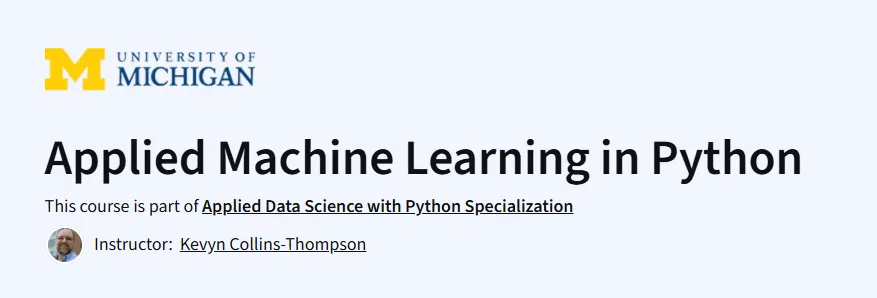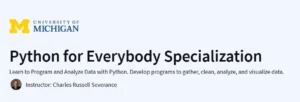What will you learn in Applied Machine Learning in Python Course
Build and evaluate supervised and unsupervised models using scikit‑learn (e.g. decision trees, random forests, regression, K‑means clustering).
Understand techniques for model validation, overfitting prevention, cross-validation, feature engineering, and boosting methods.
Learn to apply ensemble methods to improve predictive accuracy and solve classification/regression tasks.
Gain practical workflows for machine learning projects—from dataset preparation through model tuning to evaluation.
Program Overview
Module 1: Fundamentals of Machine Learning
Duration: ~6 hours
Topics: ML lifecycle, supervised vs unsupervised learning, intro to scikit‑learn
Hands-on: Build K‑nearest neighbors and linear regression models on example datasets
Module 2: Decision Trees & Random Forests
Duration: ~1 week
Topics: Tree-based models for classification and regression, feature importance
Hands-on: Train and evaluate random forest models with cross-validation
Module 3: Clustering & Feature Engineering
Duration: ~1 week
Topics: K‑means clustering, dimensionality issues, feature scaling
Hands‑on: Cluster unlabeled data and improve performance with engineered features
Module 4: Ensemble Methods & Model Optimization
Duration: ~1 week
Topics: Gradient boosting, bagging, overfitting mitigation, hyperparameter tuning
Hands-on: Apply boosting techniques and cross-validated grid search for model improvement
Get certificate
Job Outlook
High demand for machine learning skills in roles like ML Engineer, Data Scientist, and Predictive Analytics Specialist
Applicable across industries—tech, finance, healthcare, marketing—with salaries from $80K–$150K+
Frequent hiring value for experience with Python, scikit‑learn, and real-world project workflows
Useful for freelance ML projects, startup technical roles, or building portfolio pieces for career switchers
Specification: Applied Machine Learning in Python Course
|
FAQs
- Prior experience with Python, Pandas, and NumPy is recommended.
- Assumes familiarity with basic data handling and visualization.
- Focuses on practical ML implementation using scikit-learn.
- Ideal for learners who have completed foundational Python and data science modules.
- Not suitable for absolute beginners in programming or ML.
- Covers decision trees, random forests, regression, and K‑means clustering.
- Teaches ensemble methods and boosting for improving model accuracy.
- Includes hands-on projects for training, validation, and evaluation.
- Focuses on real-world predictive modeling applications.
- Prepares learners to apply ML in diverse business and technical scenarios.
- Applicable for roles like ML Engineer, Data Scientist, or Predictive Analytics Specialist.
- Provides practical workflow skills from data prep to model evaluation.
- Builds competency in scikit-learn and ensemble methods.
- Enhances portfolio for career switchers or freelancers.
- Valuable across industries: tech, finance, healthcare, and marketing.
- Four modules with durations ranging from ~6 hours to 1 week each.
- Hands-on projects and exercises included for each topic.
- Self-paced format allows flexible scheduling.
- Covers fundamentals, decision trees, clustering, feature engineering, and ensemble methods.
- Ideal for learners seeking practical ML experience efficiently.
- Learn cross-validation and hyperparameter tuning.
- Understand overfitting, bias-variance trade-offs, and model optimization.
- Apply feature engineering to enhance predictive accuracy.
- Gain hands-on experience with boosting and bagging techniques.
- Skills are directly transferable to real-world machine learning projects.





